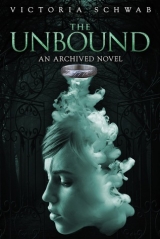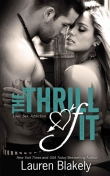
Текст книги "The Unbound"
Автор книги: Victoria Schwab
Жанры:
Подростковая литература
,сообщить о нарушении
Текущая страница: 20 (всего у книги 20 страниц)
In the Outer, Wesley’s noise pours through my head, a tangle of want and love, relief and shock and fear. I don’t know what’s singing across my skin, but I don’t pull away. I trust him with it.
Most of the buildings look all right—though the fire ate away a good deal of the ivy—but the field with its streamers and lanterns and booths is a charred black mess.
“Is everyone okay?”
“A few burns here, a few stitches there, but everyone will live.”
My eyes slide from her face to her clothing. The black of her cotton shirt is crusted darker with blood, its stain streaking across her exposed skin. “Everyone except Eric,” I say as she leads us around the scorched scene and toward the front gate. “That’s why you were late.”
She nods grimly. “I tried to get his body into one of the flare-up fires before the emergency vehicles got here. Make it look like an accident.”
“And Sako?” I ask.
Dallas rubs her hands together, and blood flakes off to the ground below. “She took off. I sent Zachary’s partner, Felicia, to find her.”
“I think I broke her nose,” says Wesley.
Dallas gives him a once-over. “It looks like she got in a few good hits.”
“So you’re Crew, too?” I ask as she leads us toward the burned remains of the festival.
“No,” says Dallas. “I’m what you might call a field assessor. It’s my job to make sure everything and everyone ticks and tocks the way they should.”
“And if they don’t?” asks Wes.
She shrugs. “If they belong to the Archive, I turn them in. If they belong to the Outer, I fix them myself.”
“You make alterations,” I say. “Wipe memories.”
“When I have to,” she says. “It’s my job to clean up. I already took care of that cop, Kinney. I’ll have to send Crew in to get the evidence, but at least I carved you out of his head. As far as he knows, the explosions are what knocked him out.”
So many questions are rolling through my mind, but we reach the front gates, which have been pried open. Everyone’s corralled there, and two firemen rush over.
“Where did you three come from?” one demands.
“These two got trapped under one of the booths,” says Dallas, her tone shifting effortlessly to one of authority. “I can’t believe you didn’t find them sooner. Better make sure they’re both okay.”
And before they can ask who she is and what she’s doing there, she turns and ducks under the yellow tape that’s been strung up across the gate and vanishes into the swell of students and teachers and parents that fill the lot. EMTs pull Wes and me apart to check us out, and I slide my ring back on, amazed by how quickly I’ve become accustomed to the world without it.
The EMT looks me over. Most of my injuries I can blame on the booth that apparently collapsed on top of us, but the wire marks on my wrists are harder to explain. I’m lucky that there are too many people who need looking after and not enough people to do it; the EMT listens when I tell him I’ll be okay and lets me go.
But Wesley is either a less convincing liar or he’s in worse shape than I realized, because they insist on taking him to the hospital to be safe. The ambulance goes out of the lot before he can say much more to me than, “Leave the window open.”
I’ve barely ducked under the yellow tape when someone shouts my name, and I look up to see the rest of the Court huddled on the sidewalk, a little singed but otherwise unhurt. There is a stream of where were yous and what happeneds and are you hurts and is Wesley with yous and is he okays and that was crazys before they finally settle down enough to let me answer. Even then I only get halfway through before Cash makes a crack about how this will go on his feedback card for sure—and Saf elbows him and says she heard that someone died in there, and how can he be making jokes? Amber comments on traumatic experiences being optimal times for levity, and then I hear my name again, and turn to find my parents pushing through the crowd toward me, and I get out half of “I’m okay” before my mother throws her arms around my neck and starts sobbing.
Dad wraps his arms around us both, and I don’t need to have my ring off to know their minds, to feel their relief tangled with their desperate need to protect the child they have left and their fear that they can’t. I can’t protect them, either. Not from losing me—not every time—but tonight I’m here, and so I hold them tighter and tell them it’s going to be okay.
And for the first time in a very long time, I believe it.
AFTER
I’M SITTING ON the edge of my bed that night in my ruined uniform, the silver horns still snagged in my hair, smelling of smoke and blood and thinking of Owen. I am not afraid of sleeping, though I wish Wesley were here with me. I am not afraid of nightmares, because mine came true and I lived through them.
I get to my feet and begin to peel off my ruined uniform, wincing as my stiff and wounded body protests every movement. I manage to tug my shirt over my head, then shed my skirt, and finally my shoes, unlacing them and tugging them off one at a time. I pull the first one off and set it on the bed beside me. When I pull the second shoe off and turn it over, a square of folded paper falls out onto the floor.
I cringe as I kneel to pick it up, smoothing the page. It’s blank but for a single word in the lower right corner, written in careful script: ALL. I run my thumb over the word.
I wasn’t going to take it.
I crouched there over Owen’s body, listening to the sounds of footsteps, counting the seconds, and feeling dazed and numb. I didn’t plan to take it, but one second I was just sitting there and the next my hands were patting him down, digging the folded page out of his pocket, slipping it into my shoe. The moment was easy to hide. To bury.
Now, as I stare down at the page, I consider burning it. (Of course Owen didn’t just burn the ledger; he burned the rest of the ledger to cover the fact that this page was missing.)
The thing is, Owen was so wrong about so many things.
But I don’t know if he was wrong about everything.
I want to believe in the Archive. I want to. So I don’t know whether it’s doubt or fear, weakness or strength, Da’s voice in my head warning me to be ready for anything or Owen’s telling me it’s time for change, or the fact that I have seen too much tonight, that made me take the paper from Owen’s pocket.
I should burn it, but I don’t. Instead I fold it very carefully—each time pausing to decide if I want to destroy it, each time deciding not to—until it’s the size it was before. And then I pull The Inferno from my shelf, slip the square of stolen paper between its pages, and set the book back.
Maybe Owen was right.
Maybe I am a bringer of change.
But I’ll decide what kind.
ACKNOWLEDGMENTS
They warn you about sequels.
They tell you to stock up on caffeine and pajama pants. They tell you to strap yourself down against the storm. They tell you that it will all be worth it in the end. That you’ll get through it.
But they never tell you how.
The answer?
People.
People who keep you grounded. People who keep you sane. Who talk plot. Talk pacing. Talk character.
People who answer hypothetical questions about really strange things without looking at you like you’ve lost your mind.
People who steal the delete key from your keyboard when you decide at two a.m. that maybe you should hold it down.
People who know when you need to be left alone and when you need to be dragged from the computer into the light of day (or the darkness of a laser tag arena).
People who care. Who believe. Even when you don’t.
This was not an easy book, in any sense. It fought back. It dragged me through mud and thistle. There were casualties. Hours. Drafts.
But I had people.
I had my mother, who reminded me to eat and breathe, and my father, who reminded me to swim until the world felt small enough again.
I had my NYC housemates, Rachel and Jen, who knew when I needed noise and when I needed quiet (and when I needed to watch cartoons).
I had Carla and Courtney, who hauled me to my feet and dusted me off and squared me on my path.
I had my agent, Holly, who told me I would find a way, because I always did.
I had my editors, Abby and Lisa, who believed in the books, and in me.
And I had you.
VICTORIA SCHWAB is the author of several novels, including The Near Witch—which Kirkus praised for its “shivery horror tang” and “extraordinary sense of place”—and The Archived, of which The Horn Book said “[Schwab] writes of death, sorrow, and family love with a light, intelligent touch and inventive vigor, and provides romance with a pleasing edge of unpredictability.” When she’s not wandering through foreign countries, Victoria can usually be found tucked in the corner of a coffee shop in Nashville, sipping tea and dreaming up monsters. Visit her at www.VictoriaSchwab.com








